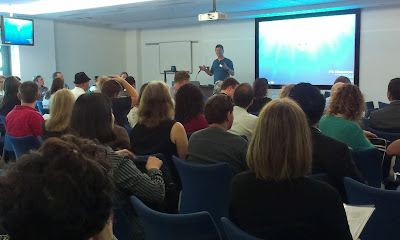Wow! What a busy few days. Only after a long weekend of
reading, coffee and running have I managed to take time to reflect on last
week’s
CSEAR Conference in St Andrews.
The Gateway Building became the hub for around 110 people
from around the world last week to discuss all manner of topics and papers
linked to social and environmental accounting.
John Roberts’ plenary ‘Between
Corporate and Political Accountability: The case of the Australian Resource
Super Tax Profits’ discussed globalisation, cosmopolitanism and asked ‘what
does it mean to be a nation state?’
The plenary also prompted further consideration of what ‘accounts’ can be – a topic that continued to be
discussed in relation to papers on accounting for nature (Jack Christian) and
external accounting and activism (Colin Dey, Ian Thomson and myself).
The workshops were based in part on a survey of the CSEAR community, which provided a very valuable snapshot of the views of CSEAR members. Further details of the survey will be made available soon via the CSEAR website, but in the meantime, part of the survey asked respondents what they thought CSEAR's vision, mission and values should be, and the latter is presented below as a word cloud:
The 2.5 days of the conference was followed by ‘Rob’s day’, celebrating the intellectual contribution of Professor Rob Gray to the field. The audience were treated to a host of wonderful and very funny presentations by Professors David Owen, Lee Parker, Richard Laughlin and Jane Broadbent.
The day also featured a quiz put together by Clemence Rannou, Delphine Gibassier and Alex Stanley, called 'Know Your Rob'. For those of you who missed the event -
a copy of the quiz can be downloaded here. Only one person managed to get all the questions correct on the day - the highly competitive Dave Owen!
All in all, a packed four days with lots of stimulating
conversation, a fair bit of banter and amazingly bathed in Scottish sunshine.
Thank you to everyone for participating and contributing
ideas and thoughts via spoken word, post-it note or survey response. Each
contribution informs and shapes ideas going forward concerning CSEAR(s)
activities for the next year. Many volunteers have signed up to be part of
organising webinars, hosting events and building networks in places around the
world. This demonstrates the capabilities and generosity of the CSEAR community
to continue to mobilise SEA scholarship in new and exciting directions.
This blog is available to communicate ideas, stimulate
debate, disseminate research findings, or announce events. Please contact us if you’d like to contribute to the blog. We look forward to
hearing from you.
Colin Dey and Shona Russell (September 2013)


